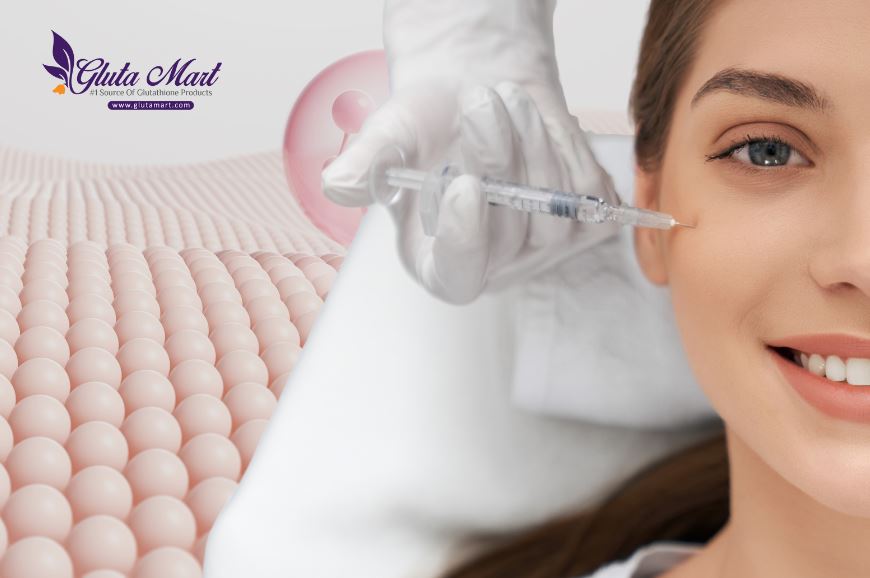
![]()
By Rachana Ramesh
Mar 31, 2025
Introduction
Pregnancy is a transformative journey, and with it comes heightened awareness about health and skincare routines. Many expectant mothers wonder whether they can continue using skin whitening injections during pregnancy. With concerns about safety, potential risks, and effects on the baby, this topic demands clarity. In this blog, we will explore whether skin whitening injections are safe for pregnant women, discuss expert opinions, and offer alternative skincare solutions for expectant mothers.
Skin whitening injections, typically composed of glutathione, vitamin C, and other antioxidants, are popular for achieving a brighter complexion. These injections work by inhibiting melanin production, the pigment responsible for skin color. While they are widely used in the beauty industry, their safety during pregnancy remains a significant concern.
Are Skin Whitening Injections Safe During Pregnancy?
1. Lack of Clinical Studies
One of the biggest concerns regarding skin whitening injections during pregnancy is the lack of scientific research. Most skin whitening products, including injections, have not been extensively tested for their effects on pregnant women and developing fetuses. Due to ethical constraints, clinical trials on pregnant women are limited, making it difficult to determine their absolute safety.
2. Potential Harmful Ingredients
Many skin whitening injections contain ingredients that could pose risks during pregnancy, such as:
-
Glutathione: While considered safe for general use, its effects on fetal development are not well-studied. High doses may interfere with the body's natural antioxidant balance.
-
Hydroquinone: This skin-lightening agent is absorbed into the bloodstream at a higher rate than other topical treatments. Studies suggest that around 35–45% of hydroquinone is absorbed when applied to the skin, making it a potential risk during pregnancy.
-
Vitamin C in High Doses: While vitamin C is essential, excessive doses through injections may disrupt normal pregnancy processes.
3. Risk of Allergic Reactions and Side Effects
Pregnancy alters the immune system, making expectant mothers more susceptible to allergic reactions and side effects. Some potential side effects of skin whitening injections include:
-
Nausea and dizziness
-
Skin rashes and irritation
-
Liver and kidney stress due to excess glutathione metabolism
-
Hormonal imbalances that may affect fetal development
Frequently Asked Questions (FAQs)
Since there are no conclusive studies, it is best to avoid unnecessary risks. Some ingredients in these injections could cross the placenta and potentially impact fetal development.
2. Are There Any Pregnancy-Safe Alternatives for Skin Brightening?
Yes, expectant mothers can opt for natural and pregnancy-safe skincare alternatives, including:
-
Aloe Vera Gel: Helps soothe and brighten skin naturally.
-
Vitamin C Serums (Pregnancy-Safe Formulations): Supports collagen production and enhances skin glow.
-
Coconut Oil and Shea Butter: Provide deep hydration and even out skin tone.
-
Lemon Juice and Honey Masks: Naturally brighten the skin without harmful chemicals.
If you wish to resume skin whitening injections, it is advisable to wait until after breastfeeding. Consulting a dermatologist before restarting any cosmetic treatment ensures safety for both mother and baby.
4. Why Does Skin Darken During Pregnancy?
Pregnancy-related skin changes, including melasma (pregnancy mask) and hyperpigmentation, occur due to hormonal fluctuations. These conditions typically fade postpartum, reducing the need for intensive whitening treatments.
5. What Are Some Natural Ways to Maintain Skin Glow During Pregnancy?
Maintaining a radiant complexion during pregnancy is possible with:
-
Hydration: Drinking plenty of water helps flush out toxins and keeps the skin hydrated.
-
Balanced Diet: Eating antioxidant-rich foods like berries, nuts, and leafy greens promotes skin health.
-
Gentle Skincare Routine: Using mild, pregnancy-safe cleansers and moisturizers prevents irritation.
-
Sunscreen: Protecting skin from UV rays minimizes hyperpigmentation.
Dermatologists and medical experts strongly advise against using skin whitening injections during pregnancy due to insufficient research on their safety. The American College of Obstetricians and Gynecologists (ACOG) recommends avoiding unnecessary chemical exposure during pregnancy to ensure maternal and fetal well-being.
Conclusion
While achieving flawless skin is a common desire, safety should always be the top priority during pregnancy. Due to the lack of research, potential risks, and possible side effects, it is best to avoid skin whitening injections while expecting. Instead, opt for natural skincare alternatives, maintain a healthy lifestyle, and consult a dermatologist for pregnancy-safe options.
By making informed choices, expectant mothers can ensure both their beauty and their baby's health remain uncompromised.